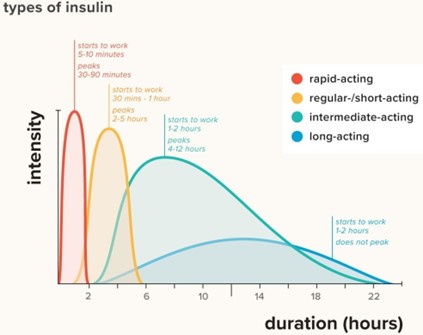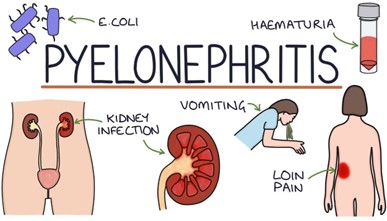A patient with diabetes is starting insulin therapy. Which type of insulin will the nurse discuss using for mealtime coverage.
Glargine (Lantus)
Detemir (Levemir)
Lispro (Humalog)
NPH (Humulin N)
The Correct Answer is C
The nurse will discuss using rapid-acting insulin such as Lispro (Humalog) for mealtime coverage in a patient with diabetes who is starting insulin therapy. Rapid-acting insulin begins to work quickly after injection, usually within 15 minutes, and peaks at around 1 hour. This makes it an effective choice for covering the rise in blood sugar that occurs after meals.
Options A, B, and D are all long-acting insulins that are used to provide a basal level of insulin coverage throughout the day but are not appropriate for mealtime coverage.

Nursing Test Bank
Naxlex Comprehensive Predictor Exams
Related Questions
Correct Answer is ["A","B","E"]
Explanation
Answer c is incorrect because hyperthyroidism typically causes hypertension, not hypotension. Answer d is also incorrect because hyperthyroidism typically causes increased, not decreased, deep tendon reflexes. Answer f is incorrect because hyperthyroidism typically causes diarrhea, not constipation.

Correct Answer is A
Explanation
The most helpful finding by the nurse in determining whether a 67-yr-old patient with benign prostatic hyperplasia has an upper urinary tract infection (pyelonephritis) would be
**costovertebral tenderness**⁴. This is because costovertebral tenderness is a common symptom of pyelonephritis⁵. Pyelonephritis is an infection of the upper urinary tract that can cause fever, chills, flank pain, nausea, vomiting, and costovertebral tenderness⁵. Foul-smelling urine and bladder distention are not specific symptoms of pyelonephritis⁵. Suprapubic discomfort can be a symptom of lower urinary tract infection⁵.

Whether you are a student looking to ace your exams or a practicing nurse seeking to enhance your expertise , our nursing education contents will empower you with the confidence and competence to make a difference in the lives of patients and become a respected leader in the healthcare field.
Visit Naxlex, invest in your future and unlock endless possibilities with our unparalleled nursing education contents today
Report Wrong Answer on the Current Question
Do you disagree with the answer? If yes, what is your expected answer? Explain.
Kindly be descriptive with the issue you are facing.
